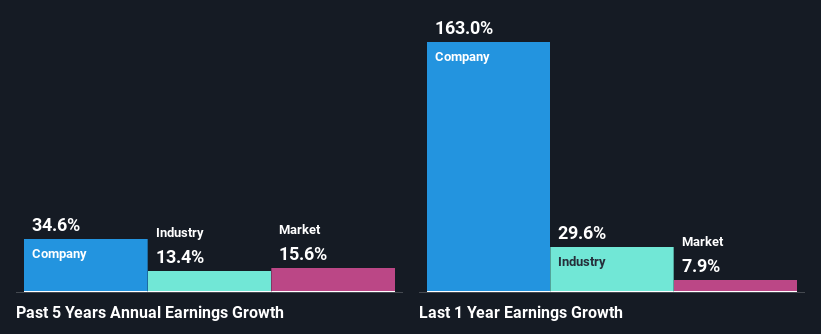Are Independence Realty Trust, Inc.'s (NYSE:IRT) Fundamentals Good Enough to Warrant Buying Given The Stock's Recent Weakness?
Independence Realty Trust (NYSE:IRT) has had a rough month with its share price down 13%. However, the company's fundamentals look pretty decent, and long-term financials are usually aligned with future market price movements. Specifically, we decided to study Independence Realty Trust's ROE in this article.
ROE or return on equity is a useful tool to assess how effectively a company can generate returns on the investment it received from its shareholders. In simpler terms, it measures the profitability of a company in relation to shareholder's equity.
View our latest analysis for Independence Realty Trust
How Is ROE Calculated?
ROE can be calculated by using the formula:
Return on Equity = Net Profit (from continuing operations) ÷ Shareholders' Equity
So, based on the above formula, the ROE for Independence Realty Trust is:
3.2% = US$121m ÷ US$3.7b (Based on the trailing twelve months to December 2022).
The 'return' is the income the business earned over the last year. One way to conceptualize this is that for each $1 of shareholders' capital it has, the company made $0.03 in profit.
Why Is ROE Important For Earnings Growth?
So far, we've learned that ROE is a measure of a company's profitability. Based on how much of its profits the company chooses to reinvest or "retain", we are then able to evaluate a company's future ability to generate profits. Assuming everything else remains unchanged, the higher the ROE and profit retention, the higher the growth rate of a company compared to companies that don't necessarily bear these characteristics.
A Side By Side comparison of Independence Realty Trust's Earnings Growth And 3.2% ROE
As you can see, Independence Realty Trust's ROE looks pretty weak. Even when compared to the industry average of 6.7%, the ROE figure is pretty disappointing. However, we we're pleasantly surprised to see that Independence Realty Trust grew its net income at a significant rate of 35% in the last five years. We believe that there might be other aspects that are positively influencing the company's earnings growth. For instance, the company has a low payout ratio or is being managed efficiently.
As a next step, we compared Independence Realty Trust's net income growth with the industry, and pleasingly, we found that the growth seen by the company is higher than the average industry growth of 13%.
Earnings growth is an important metric to consider when valuing a stock. It’s important for an investor to know whether the market has priced in the company's expected earnings growth (or decline). This then helps them determine if the stock is placed for a bright or bleak future. Has the market priced in the future outlook for IRT? You can find out in our latest intrinsic value infographic research report.
Is Independence Realty Trust Using Its Retained Earnings Effectively?
Independence Realty Trust seems to be paying out most of its income as dividends judging by its three-year median payout ratio of 73%, meaning the company retains only 27% of its income. However, this is typical for REITs as they are often required by law to distribute most of their earnings. Regardless, this hasn't hampered its ability to grow as we saw earlier.
Besides, Independence Realty Trust has been paying dividends over a period of nine years. This shows that the company is committed to sharing profits with its shareholders.
Summary
On the whole, we do feel that Independence Realty Trust has some positive attributes. That is, quite an impressive growth in earnings. However, the low profit retention means that the company's earnings growth could have been higher, had it been reinvesting a higher portion of its profits. Having said that, on studying current analyst estimates, we were concerned to see that while the company has grown its earnings in the past, analysts expect its earnings to shrink in the future. Are these analysts expectations based on the broad expectations for the industry, or on the company's fundamentals? Click here to be taken to our analyst's forecasts page for the company.
Have feedback on this article? Concerned about the content? Get in touch with us directly. Alternatively, email editorial-team (at) simplywallst.com.
This article by Simply Wall St is general in nature. We provide commentary based on historical data and analyst forecasts only using an unbiased methodology and our articles are not intended to be financial advice. It does not constitute a recommendation to buy or sell any stock, and does not take account of your objectives, or your financial situation. We aim to bring you long-term focused analysis driven by fundamental data. Note that our analysis may not factor in the latest price-sensitive company announcements or qualitative material. Simply Wall St has no position in any stocks mentioned.
Join A Paid User Research Session
You’ll receive a US$30 Amazon Gift card for 1 hour of your time while helping us build better investing tools for the individual investors like yourself. Sign up here

 Yahoo Finance
Yahoo Finance 
